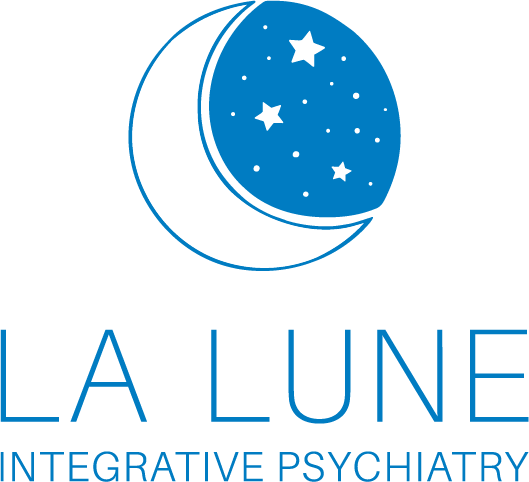5 Environmental Exposures That Impact Physical & Mental Health
By La Lune Integrative Psychiatry Updated on February 17, 2024 — Medically Reviewed by Elita Wong, Board-certified Psychiatric Nurse Practitioner
In a world where our surroundings play a pivotal role in shaping our well-being, it's crucial to understand the intricate connection between the environment and our health. In this blog, we’ll seek to answer the question: How does what I consume (in food and drink) and use (in makeup and other household products) affect my mental health? We'll shine a spotlight on a particularly significant factor—endocrine disruptors. These subtle yet potent influencers wield the power to disrupt the delicate balance of our hormonal systems, paving the way for a cascade of effects on our overall wellness.
What does the endocrine system have to do with mental health?
First, a quick recap. Your endocrine system is responsible for creating and releasing hormones, including insulin, estrogen, and adrenaline. Through the regulation of these hormones, the endocrine system helps maintain countless bodily functions. Hormones such as cortisol, produced by the adrenal glands, are involved in the body's stress response and can impact anxiety levels. Additionally, neurotransmitters like serotonin, regulated by hormones such as melatonin, contribute to mood stability and anxiety.
What Is an Endocrine Disruptor?
Endocrine disruptors have the potential to mimic or disrupt the body's natural hormones, resulting in possible imbalances and adverse health effects. These disruptive substances are commonly present in everyday household items like fragrances, personal care products, and food packaging. Exposure to these endocrine disruptors can occur through direct contact, ingestion via food, or inhalation. Sources of these substances encompass a range of chemical origins, including agricultural, residential, industrial, and pharmaceutical contexts.
5 Endocrine Disruptors That Affect Our Physical & Mental Health
The following list contains known endocrine disruptors or chemicals that could be disrupting your mental and physical health.
#1 Phthalates
Phthalates are widely used chemicals that serve to make plastics more pliable. They are used in everything from cosmetics to food packaging. Phthalates adversely affect multiple body organs. They have been linked to attention deficit hyperactivity disorder (ADHD), allergies, and other conditions. Recent concerns also highlight the potential harm of phthalates on development and reproductive systems, with children being particularly vulnerable to exposure during early growth compared to adults.
#2 Bisphenol A (BPA)
BPA is another well-known endocrine disruptor. BPA is an industrial chemical used to manufacture plastics. It has been widely used since the 1950s. Baby bottles, food containers, and water bottles may all contain BPA. This chemical can leach out of food containers and cause significant health issues. Even low doses of BPA have been shown to induce adverse health effects, including infertility, diabetes, heart disease, and unwanted weight gain. Additional research has linked BPA exposure (pre- and postnatally) to mental health conditions such as anxiety, and autism as well as ADHD.
#3 Pesticides such as Atrazine, Glyphosates, and Chlorpyrifos
Pesticides like Atrazine, Glyphosate, and Chlorpyrifos have raised concerns due to their documented harmful effects on human health and the environment.
Atrazine, a widely used herbicide, is recognized as an endocrine disruptor linked to heart, liver, and kidney damage, as well as reproductive dysfunction and behavioral abnormalities.
Glyphosate, the active ingredient in the herbicide Roundup, is a well-studied substance that has been associated with potential carcinogenicity and other neurotoxic effects, and has raised concerns about its impact on soil health.
Chlorpyrifos, a common insecticide, has been linked to developmental issues in children, including neurodevelopmental disorders.
Additionally, these pesticides contribute to environmental pollution, contaminating water sources and affecting non-target organisms.
#4 Triclosan
Once widely used in hand sanitizers and soap, this chemical is still used in antibacterial products today. Toothpaste, facial cleaners, dishwashing soap, and mouthwash may all contain triclosan. It’s so widely used that more than 75 percent of people in the United States have been exposed. Triclosan is an endocrine-disrupting chemical that can lead to problems with hormone function. Studies have shown that exposure to triclosan can increase the risk of certain cancers and a recent study found a link between maternal exposure to triclosan during pregnancy and an autism spectrum diagnosis in their children.
#5 Dioxins
Dioxins are found throughout the world, arising as byproducts from processes such as paper bleaching and herbicide production. Exhibiting remarkable persistence, these chemicals resist rapid degradation in the environment and can be emitted into the air through waste incineration, thereby contaminating soils, sediments, and various food sources. Particularly susceptible are dairy products, meat, fish, and shellfish. Infamous for their high toxicity, dioxins possess the capacity to disrupt the endocrine system and compromise immune function. This is of particular concern to individuals who pursue an all-fish diet in the name of health, only to risk greater exposure to these chemicals. Fortunately, the department of health offers state-wide initiatives about meal planning with fish to help provide guidance in this area.
Exposure to dioxin, whether during pregnancy or in adulthood, has been associated with changes in brain structure that may lead to cognitive issues and unusual social-emotional behavior. Moreover, studies in both humans and animals suggest a connection between dioxin exposure and autism spectrum disorder (ASD), indicating that dioxin may play a role in the development and underlying causes of ASD.
Endocrine Disruptors and Gut-Brain Health
The connection between endocrine disruptors and gut-brain health is an emerging area of research. Endocrine disruptors, which can interfere with hormonal balance, may impact the gut-brain axis—the bidirectional communication between the gut and the brain. Exposure to these disruptors, such as in the ways listed above, has been linked to alterations in gut microbiota composition, intestinal barrier function, and immune responses. These disruptions in the gut environment can, in turn, influence neurological function and potentially contribute to conditions like anxiety, depression, and neurodevelopmental disorders.
Understanding and addressing the interplay between endocrine disruptors and gut-brain health is a complex but important aspect of comprehending the broader impact of environmental factors on overall well-being.
Signs Your Gut-Brain Axis Is Off-Balance
How can gut-brain interconnectedness present in terms of how we feel? Here are just a few common experiences from some of our patients:
Fatigue and insomnia - Not being able to sleep or feeling tired all of the time are both signs that your gut health is affecting your health.
Anxiety and depression - If you have been feeling moody or depressed, it could be because of gut health. Both anxiety and depression have been linked to the gut-brain axis.
Gastrointestinal symptoms - You may have heard about irritable bowel syndrome (IBS) or gastritis with stress. This could present as diarrhea, constipation, nausea, stomach pains, or all of the above.
What Can You Do About Endocrine Disruptors?
Since endocrine disruptors are everywhere, it’s almost impossible to completely avoid them. However, there are several things that you can do to reduce your exposure to these harmful chemicals and make informed choices.
Dietary Choices:
Learn about the bioaccumulation and biomagnification of endocrine disruptors, especially in the context of certain animal products.
Prioritize fish and seafood with lower toxicity levels. You can follow specific advice for preparing and eating seafood in order to minimize your exposure to endocrine disruptors. Your state EPA website can show information about species of seafood and their level of toxicity based on the body of water they reside in.
Refer to the Dirty Dozen/Clean 15 list to guide your decision on buying organic produce based on your budget and priorities. Some fruits such as avocados, have little residue on the surface, versus grapes or stone fruits.
Clean fruits and vegetables to reduce pesticide surface residue.
Around the House:
Choose personal care products without endocrine-disrupting chemicals such as triclosan. Look for alternative hand sanitizers.
Use fragrance-free or naturally scented products to reduce exposure to harmful chemicals.
Opt for natural cleaning products or make your own using simple ingredients like vinegar and baking soda.
Minimize the use of single-use plastics, as they can contain endocrine-disrupting chemicals.
Select glass or stainless steel containers for food storage and water bottles to avoid potential chemical leaching from plastics.
Be mindful of using plastic wrap and containers in the microwave, as heat can increase chemical release.
Investigate the ingredients in household items such as furniture, carpets, and electronics to reduce exposure to flame retardants and other chemicals.
Open your windows to circulate fresh air into your home so that any harmful fumes from household products don’t accumulate.
Mindful Purchasing:
When buying new products, check for labels indicating they are free from harmful chemicals.
Understand organic labeling to make informed choices about the products you purchase.
Support companies that prioritize environmentally friendly and non-toxic practices.
Protect Your Health with Holistic Practitioners at La Lune Integrative Psychiatry
If you are interested in getting a comprehensive evaluation of your mental and physical health, including how your environmental exposure may contribute to your symptoms, then consider making an appointment with one of our providers for an evaluation. Choose a provider who practices holistically and considers the impact of environmental exposures on the human body.
La Lune Integrative Psychiatry offers telehealth evaluations in Arizona, Colorado, Oregon, and Washington. Connect with us today to get scheduled with a clinician who can support your journey to health.
Disclaimer: This website does not provide medical advice and may be out of date. The information, including but not limited to text, PDFs, graphics, images, and other material contained on this website are for general educational purposes only. No material on this site is intended to be a substitute for professional medical advice, diagnosis, or treatment, and does not create a patient-doctor relationship. Always seek the advice of your qualified healthcare provider with any questions you may have regarding a medical condition, lifestyle or dietary changes, treatments, and before undertaking a new health care regimen. Never disregard professional medical advice or delay in seeking it because of something you have read on this website.




